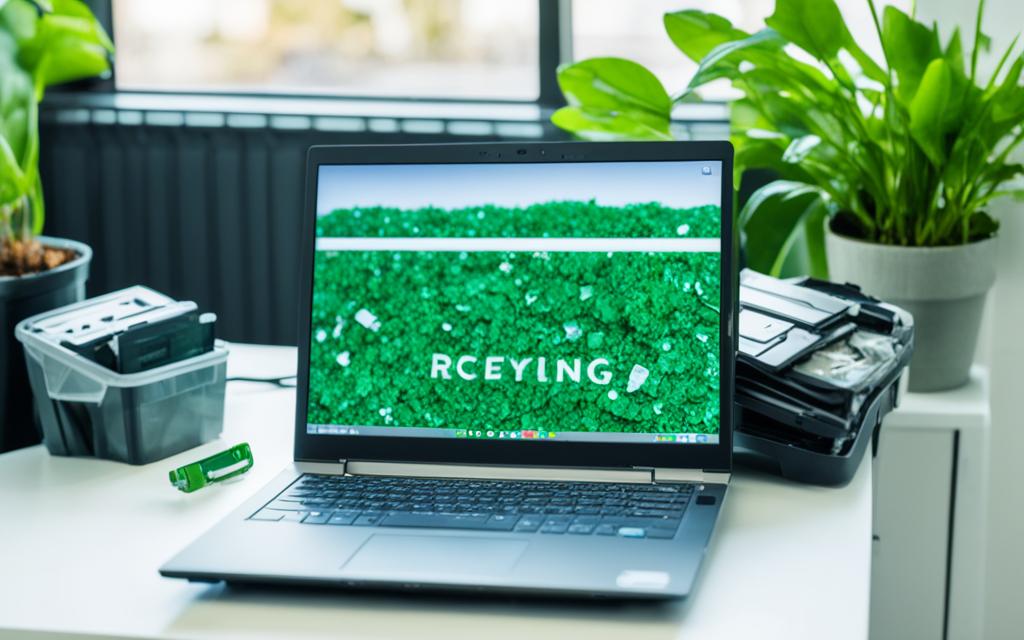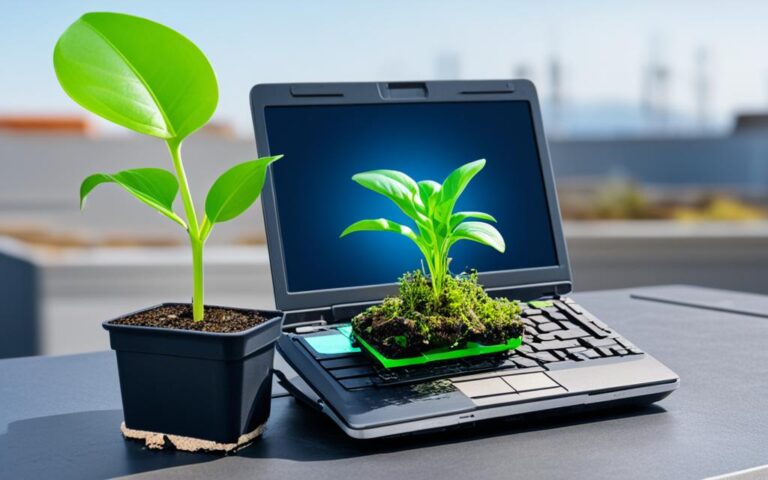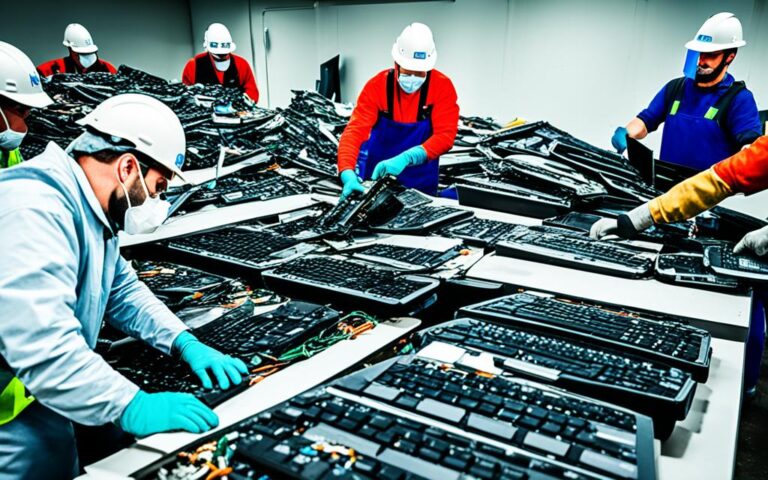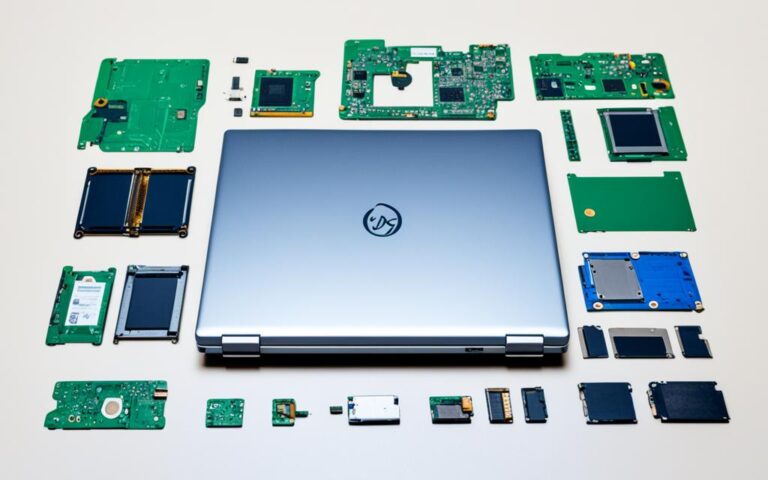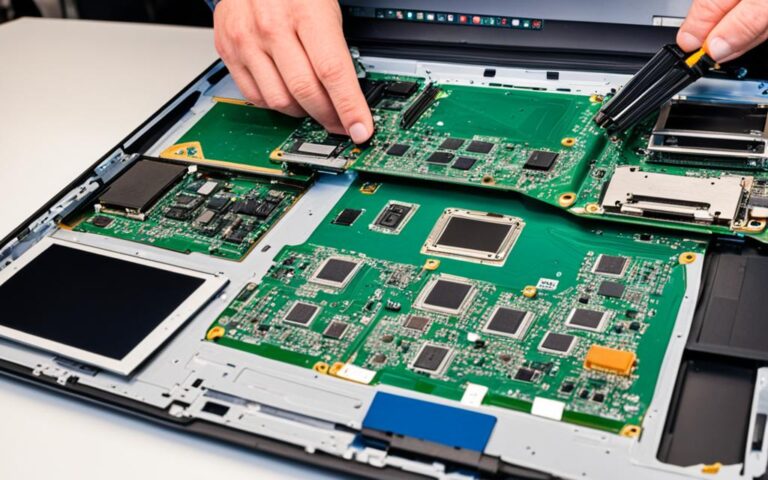How to Make Laptop Recycling a Habit: Tips for Everyday Life
Recycling is a vital part of minimizing environmental impact and reducing waste. However, incorporating sustainable behaviour into our daily lives can be challenging. Here are some tips to help you improve your laptop recycling habits:
First and foremost, make sure you have a designated recycling bin for your old laptops. This will make it easier to separate them from other electronic devices and ensure they are properly recycled.
It’s also helpful to educate yourself about the proper way to recycle laptops. This includes removing personal data and wiping the hard drive to protect your privacy. You can find step-by-step guides online that will walk you through the process.
Additionally, consider donating or selling your old laptops if they are still in working condition. This not only extends the lifespan of the device but also ensures that someone else can benefit from it.
Lastly, make laptop recycling a regular part of your routine. Set reminders or create a schedule for when you should recycle your old laptops. By incorporating this habit into your everyday life, you not only reduce waste but also contribute to a greener environment.
By following these simple tips, you can make laptop recycling a habit in your everyday life. Together, we can create a more sustainable future.
Tips for Buying a Sustainable Laptop
When purchasing a new laptop, it is essential to consider its sustainability. Opting for a sustainable laptop not only benefits the environment but also ensures that your device aligns with your eco-friendly values. Here are some tips to help you make an environmentally conscious choice:
- Look for international ecolabels: Check if the laptop has certifications like EPEAT® or ENERGY STAR®. These labels indicate that the device meets specific environmental criteria, such as energy efficiency and reduction of hazardous materials.
- Assess sustainable features: Consider the laptop’s energy efficiency, durability, and ease of repair. Energy-efficient laptops consume less power and reduce their environmental impact. Durable laptops minimize electronic waste by lasting longer, and those that are repairable instead of disposable contribute to a circular economy.
- Recycling programs: Some laptop brands offer recycling programs for old devices when purchasing a new one. By participating in these programs, you can ensure that your old laptop is responsibly disposed of and potentially recycled into new products, reducing e-waste.
“Sustainable laptops not only benefit the environment but also ensure that your device aligns with your eco-friendly values.”
The Zenbook: An Eco-Friendly Laptop Option
An excellent example of a sustainable laptop is the Zenbook. This eco-friendly laptop option combines sleek design and cutting-edge technology with a commitment to environmental stewardship. The Zenbook is renowned for its thin and lightweight design, making it a portable and energy-efficient choice.
| Key Features | Benefits |
|---|---|
| Energy Efficiency | Reduces energy consumption and carbon footprint |
| Durability | Long-lasting device that minimizes electronic waste |
| Ease of Repair | Supports a circular economy by promoting repairability |
By considering the sustainability of your laptop, you can contribute to a greener future while enjoying the convenience and functionality of modern technology.
Green Habits for Laptop Owners
As a laptop owner, adopting green habits can significantly minimize your environmental impact. By incorporating these habits into your daily routine, you can contribute to a more sustainable future. Here are some eco-friendly practices to consider:
- Power management: Adjust your laptop’s power settings to conserve energy. Use the sleep mode or hibernate feature when not in use, and turn off the screen when taking breaks.
- Unplug and save: Disconnect your laptop from the charger once it’s fully charged. Overcharging not only wastes electricity but can also degrade the battery over time.
- Extend lifespan: Take care of your laptop by regularly cleaning the keyboard and screen, using a laptop sleeve or bag for protection, and avoiding exposure to extreme temperatures.
- Reduce paper usage: Go digital whenever possible. Store documents, files, and notes electronically instead of printing them out.
- Upgrade responsibly: When it’s time to upgrade your laptop, consider donating or selling it instead of throwing it away. Extending the lifespan of electronics helps reduce e-waste.
- Recycling options: If your laptop reaches the end of its life, recycle it responsibly through a certified e-waste recycling facility. Check with your local authorities for recycling programs.
- Energy-efficient peripherals: Invest in energy-efficient accessories such as low-power consumption mouse, keyboard, and external hard drives to further reduce electricity usage.
Adopting these green habits not only benefits the environment but can also save you money on energy bills and promote a more sustainable lifestyle. Let’s strive towards a greener future, one laptop owner at a time!
How to Prepare a Laptop for Disposal
Before disposing of your laptop, it is crucial to ensure that it is properly prepared. Following these steps will help you protect your personal data and ensure that the laptop is ready for recycling or donation:
1. Backup Important Files
Begin by backing up any important files or documents that you want to keep. This can be done by transferring them to an external hard drive, cloud storage, or another computer. By doing so, you will have a copy of your files and can easily access them even after disposing of the laptop.
2. Wipe the Hard Drive
Next, it is essential to wipe the hard drive of your laptop to remove all personal data. This step helps protect your privacy and ensures that sensitive information does not fall into the wrong hands. There are several methods to wipe a hard drive:
- Use a Data Erasure Tool: You can use specialized software to securely erase the data on your laptop’s hard drive. These tools overwrite the existing data with random patterns, making it virtually impossible to recover.
- Reinstall the Operating System: Another option is to reinstall the operating system on your laptop. This process typically includes an option to format the hard drive, effectively deleting all data.
Choose the method that works best for you based on your technical skills and preferences. Ensure that all personal files, applications, and settings are erased from the laptop.
3. Transfer Software Licenses
If you have purchased software licenses for applications installed on your laptop, consider transferring them to another device before disposing of the laptop. Some software licenses are tied to a specific device, so it is important to review the terms and conditions of each software provider to determine whether transfer is permitted.
By transferring the licenses, you can continue using the software on a new computer without having to repurchase it, maximizing the value of your investment.
With these steps, you can ensure that your laptop is properly prepared for disposal, protecting your personal data and the environment. Remember to back up your files, wipe the hard drive, and consider transferring software licenses before parting ways with your laptop.
Conclusion
By incorporating these tips and habits into your everyday life, you can make laptop recycling a habit and contribute to a greener environment. Recycling old laptops not only helps reduce electronic waste but also conserves valuable resources and reduces the carbon footprint associated with new laptop production.
Remember to buy sustainable laptops that are designed with eco-friendly features and have a longer lifespan. Look for laptops with international ecolabels like EPEAT® or ENERGY STAR® and consider brands like Zenbook that prioritize sustainability.
Additionally, adopting green habits as a laptop owner is essential. Practice power-saving measures such as adjusting your laptop’s power settings and using sleep mode when it’s not in use. Remember to unplug chargers and other peripheral devices when they’re not in use to save energy.
When it comes time to dispose of your laptop, properly prepare it by wiping the hard drive and transferring any software licenses. This ensures your personal information is secure and allows for a smooth transition to a new owner or recycling facility.
By following these eco-friendly habits and making laptop recycling a regular part of your routine, you can make a positive impact on the environment and contribute to a more sustainable future.
FAQ
Why is laptop recycling important?
Laptop recycling is important because it helps minimize environmental impact and reduces waste. By recycling laptops, valuable materials can be recovered and reused, leading to a more sustainable future.
How can I make laptop recycling a habit in my everyday life?
To make laptop recycling a habit, you can start by purchasing a sustainable laptop with features like energy efficiency and ease of repair. Additionally, practicing green habits such as proper disposal and recycling of old laptops can contribute to a greener environment.
What are some tips for buying a sustainable laptop?
When buying a sustainable laptop, look for international ecolabels like EPEAT® or ENERGY STAR®. Consider features like energy efficiency, durability, and ease of repair. Some brands even offer recycling programs for old laptops when purchasing a new one.
What are some green habits for laptop owners to minimize environmental impact?
As a laptop owner, you can adopt green habits such as turning off your laptop when not in use, using power-saving settings, and reducing paper waste by opting for digital alternatives. It’s also important to properly dispose of and recycle old laptops when the time comes.
How do I prepare a laptop for disposal?
To prepare a laptop for disposal, you should first back up any important data and transfer software licenses. After that, wipe the hard drive to remove personal information securely. You can either use data wiping software or seek professional assistance for this process.

